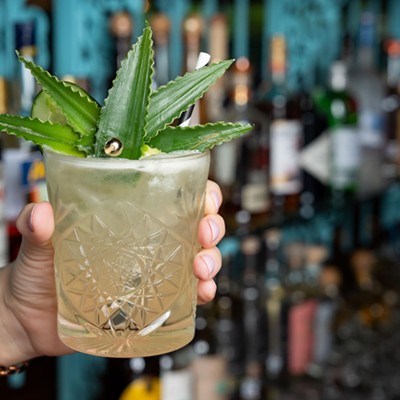Last Friday morning, I was rushing around my nine-by-six kitchen and tearing out the contents of the cupboards like a poltergeist. I was running late for our holiday luncheon at work and still needed to make a roux to make a béchamel sauce in order to make a Mornay sauce -- you get the drift -- for a cauliflower casserole. And I was completely out of flour.
I stared at the contents of my packed little pantry, dumbfounded: buckwheat groats, flaxseed meal, rainbow quinoa, forbidden rice, Bisto chip shop gravy, lentils, tin after tin of sardines, jars of pickled beets and sauerkraut, stacked cans of coconut milk and chickpeas...but no flour.
Confectioner's sugar, cane sugar, brown sugar, Stevia packets, Kosher salt, table salt, baking powder, baking soda...but no flour. Of all the ridiculous things and all the basic things to run out of...I'd run out of flour, and hadn't known to pick any up when I was at Randall's only 15 minutes earlier.
I didn't have time to make another visit, and absolutely no one at the Houston Press is going to eat a casserole dish full of steamed cauliflower without an ample blanket of cheddar cheese sauce on top. I scanned my cupboard again, desperate to find a suitable replacement.
And then I saw it: powdered yam.
Powdered (or pounded) yam is the base of one of the most common West African dishes: fufu. Now, fufu can be made from a range of different starchy plants, dried and pounded into a fine powder. But yam is the most common, especially in Nigeria.
I'd bought the powdered yam after a visit to Finger Licking Bukateria this week, which is the subject of this week's cafe review. Eager to know where the restaurant got its spicy alligator pepper, I asked our waiter -- Luc -- and he directed me to Southwest Farmer's Market, cattycorner from Finger Licking in the same parking lot off Bissonnet in Little Nigeria. While I was there, I also picked up a few ingredients to try and make fufu for myself at home.
I sat and stared at the powdered yam, considering its texture and flavor. It's finely milled and sifted, with the same weight and feel as wheat flour. And I knew from having it in fufu so often that it had a very neutral, almost nonexistent taste -- perfect for forming balls of fufu, which aren't meant as a meal in and of themselves but rather as edible (albeit healthy) utensils in West African cuisine.
With no more time to waste, I measured out a quarter cup of powdered yam and threw it in with the half a stick of butter already melted down in my sauce pan. Immediately, I could tell it wasn't enough. The 1:1 fat-to-flour ratio wasn't going to be the same here. After measuring out a bit more, I ended up with a ratio of 1/3 of a cup of powdered yam to half a stick of butter.
When I poured the milk into the roux, I was astounded to see how effortlessly the yam accepted the dairy, with nary a clump or rough spot in sight. It took on a silky, creamy texture like I'd never seen in my years of fucking up French cuisine. This looked like a professional béchamel sauce, like something my clumsy fingers could have never created in a million years with standard flour. I was enchanted, despairing suddenly that I might risk ruining it by adding shredded Cheddar cheese.
But add it I did, as well as a little alligator pepper -- smoky like paprika, but also spicy-sweet like habaneros -- in place of the cayenne called for in the casserole recipe. If I was going to go a little Nigerian, I might as well go a lot. In the end, it was one of my proudest kitchen triumphs, a small but magical discovery that thrilled me to recount to people again and again until they were sick of me.
In this week's cafe review, we explore the small but magical ways that traditional Nigerian and West African foods and flavors have worked their way into Cajun and Southern cuisine. That fu-froux (patent pending) is nothing compared to the way in which you'll be strikingly reminded of gumbo in your first bite of catfish pepper soup at Finger Licking Bukateria, or enjoy the familiar, earthy mingling of flavors between okra, tomato and onion in a bowl of okra soup eaten with a ball of fufu.
Nigerian food isn't as exotic as you'd expect, and Finger Licking Bukateria is determined to guide you in your exploration of its native cuisine with its friendly service and picture-based menu. And if you can eat Cajun food, you can certainly eat West African.
By the way, powdered yam is gluten free, making it an ideal replacement for flour and to keep in your own pantry for experimentation purposes. It's $3.99 a pound at Southwest Farmers Market.
Follow Eating Our Words on Facebook and on Twitter @EatingOurWords





